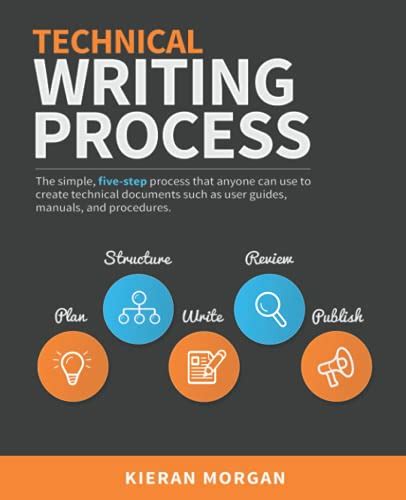Becoming A Technical Writer In 5 Simple Steps

Are you interested in pursuing a career as a technical writer? Technical writing is a profession that involves creating clear and concise documentation, such as user manuals, instruction guides, and online help systems, for complex technical products or services. It requires a unique set of skills, including strong communication, attention to detail, and the ability to explain complex concepts in a simple and accessible way. If you’re ready to embark on this exciting career path, here are five simple steps to get you started:
Step 1: Gain a Solid Foundation in Writing
To become a successful technical writer, it’s important to have a strong foundation in writing. This includes having a good grasp of grammar, punctuation, and sentence structure. Additionally, you should be able to write clearly and concisely, avoiding jargon and technical terms whenever possible. If you feel like you need to improve your writing skills, consider taking a writing course or workshop to hone your abilities.
Key Points:
- Master the basics of grammar, punctuation, and sentence structure
- Practice writing clearly and concisely
- Avoid jargon and technical terms
- Consider taking a writing course or workshop
Step 2: Develop Your Technical Skills
While strong writing skills are essential for a technical writer, it’s also important to have a solid understanding of the subject matter you’ll be writing about. This means developing your technical skills by familiarizing yourself with the tools, software, or equipment that you’ll be documenting. Take the time to learn how to use the products or services you’ll be writing about, and stay up to date with the latest industry trends and developments.
Key Points:
- Gain a deep understanding of the subject matter
- Familiarize yourself with the tools and software
- Stay up to date with industry trends
- Continuously learn and improve your technical skills
Step 3: Learn about Technical Writing Standards
Technical writing is a specialized field that follows specific standards and guidelines. To become a successful technical writer, it’s important to familiarize yourself with these standards. This includes learning about style guides, such as the Microsoft Manual of Style or the Chicago Manual of Style, as well as industry-specific guidelines for writing technical documentation. By adhering to these standards, you can ensure that your writing is consistent, professional, and easy to understand.
Key Points:
- Study style guides and industry-specific guidelines
- Learn about formatting and document structure
- Understand the importance of consistency and clarity
- Follow best practices in technical writing
Step 4: Build Your Portfolio
As with any profession, having a strong portfolio is essential for a technical writer. Your portfolio should showcase your best work and demonstrate your ability to create clear and effective documentation. If you’re just starting out in the field, consider taking on freelance or volunteer projects to build your portfolio. This will not only give you valuable experience but also provide you with tangible examples of your skills and expertise.
Key Points:
- Collect samples of your work
- Showcase your ability to write for different audiences
- Include a variety of documentation types
- Consider taking on freelance or volunteer projects
Step 5: Network and Gain Experience
Networking is a crucial aspect of any career, and technical writing is no exception. Attend industry events, join professional organizations, and connect with other technical writers to expand your professional network. Additionally, consider seeking out opportunities to gain hands-on experience, such as internships or entry-level positions. This will not only help you build your skills but also make valuable connections in the industry.
Key Points:
- Attend industry events and conferences
- Join professional organizations and online communities
- Seek out internships or entry-level positions
- Network with other technical writers
Conclusion
Becoming a technical writer may seem like a daunting task, but by following these five simple steps, you can set yourself up for success. Remember to continuously improve your writing and technical skills, stay up to date with industry standards, build a strong portfolio, and network with other professionals. With dedication and hard work, you can embark on a rewarding career as a technical writer.
Frequently Asked Questions
Q: What qualifications do I need to become a technical writer?
A: While there are no specific qualifications required to become a technical writer, having a degree in a relevant field, such as English, communications, or computer science, can be beneficial. Additionally, gaining experience through internships or entry-level positions can help you develop the necessary skills and knowledge.
Q: How can I improve my writing skills?
A: Improving your writing skills takes practice and dedication. Consider taking writing courses or workshops, reading books on writing, and seeking feedback from others. Additionally, practice writing regularly and learn from your mistakes.
Q: What are some common tools used by technical writers?
A: Technical writers often use tools such as Microsoft Word, Adobe FrameMaker, MadCap Flare, and various content management systems. Familiarize yourself with these tools and learn how to use them effectively.
Q: How can I find freelance or volunteer opportunities as a technical writer?
A: There are several websites and online platforms where you can find freelance or volunteer opportunities as a technical writer. Some popular options include Upwork, Freelancer, and VolunteerMatch. Additionally, consider reaching out to local businesses or nonprofit organizations that may need assistance with their documentation.
Q: Is technical writing a lucrative career?
A: Technical writing can be a lucrative career, especially for those with specialized knowledge or experience in a particular industry. Salaries can vary depending on factors such as location, experience, and the complexity of the subject matter.
